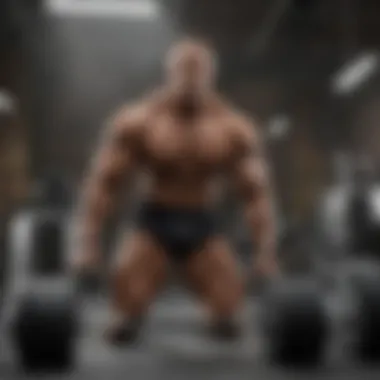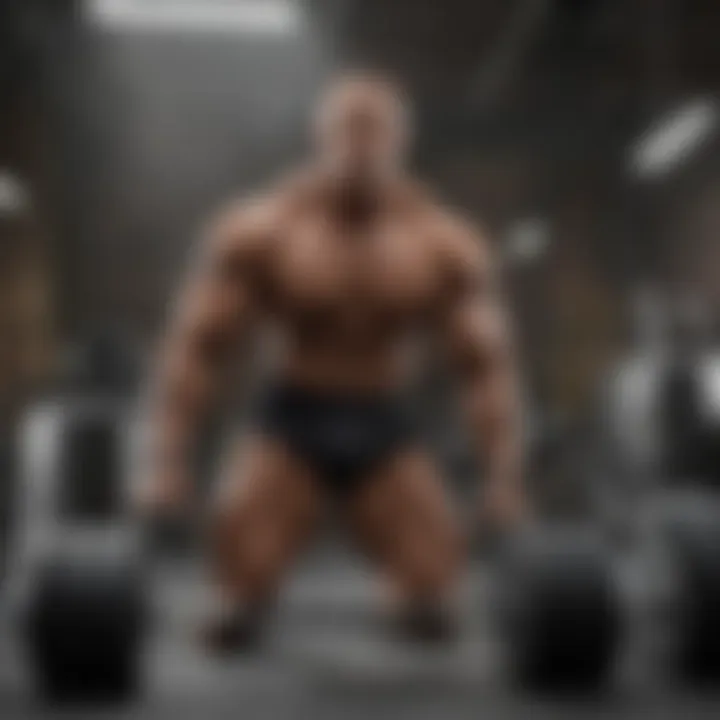Effective Diet Strategies for Vegan Bodybuilders


Intro
As the trend of veganism gains momentum, an increasing number of bodybuilders are shifting toward plant-based diets. This transition isn’t merely about following a fad; it's a deliberate choice rooted in health, ethics, and sustainability. Vegan bodybuilders must navigate a multitude of challenges to ensure they hit their goals without compromising their values. What's fascinating is that with strategic planning, those challenges can transform into opportunities, allowing individuals to fuel their muscles with vibrant plant-based foods.
Embarking on the vegan bodybuilding journey calls for a strong understanding of nutrition, particularly when it comes to balancing macronutrients like proteins, carbohydrates, and fats, alongside essential vitamins and minerals. Each of these elements plays a unique role in muscle growth and recovery, making it crucial for vegan athletes to prioritize their dietary choices. Furthermore, many are unaware that plant-based diets can support mental well-being, leading to improved focus and discipline during workouts.
To fully harness the potential of a vegan lifestyle in bodybuilding, it is important to explore the key benefits, practical tips, and effective meal strategies tailored to meet the dietary needs of strength seekers committed to both ethical principles and fitness aspirations.
Understanding Vegan Bodybuilding
Vegan bodybuilding is more than just a workout routine; it's a holistic lifestyle choice that blends the principles of fitness with a commitment to plant-based nutrition. This section serves to illuminate the critical aspects of understanding vegan bodybuilding, emphasizing the intricate connection between diet, muscle building, and ethical values. Those in the fitness community are increasingly recognizing the importance of aligning dietary choices with personal beliefs, thus fostering not only health but also compassion towards animals and the environment.
The rise of veganism has paved the way for innovative dietary strategies that are crucial for anyone striving to build muscle and enhance performance. Adopting a vegan diet necessitates a keen awareness of nutritional needs—especially for bodybuilders who must ensure their caloric and protein requirements are met. This journey demands conscious selection of food sources that are not only rich in macronutrients but also in vitamins and minerals to effectively support rigorous training and recovery.
Moreover, understanding vegan bodybuilding is vital for overcoming challenges that may arise along the way. The risks of protein deficiencies, insufficient caloric intake, or lack of certain nutrients can be more pronounced in a plant-based regimen, making it essential to strategize accordingly.
Defining Veganism
Veganism encompasses more than just the absence of animal products in one's diet. At its core, it represents a lifestyle that seeks to minimize harm to animals, promotes sustainable living, and fosters health and wellness through plant-based nutrition. A vegan diet typically includes fruits, vegetables, legumes, grains, nuts, and seeds, and excludes meat, dairy, eggs, and other animal-derived products.
For bodybuilders, embracing veganism means making informed decisions about their food choices. It is about understanding the nuances of plant-based nutrients and how they interact to promote muscle repair and growth. Because of this increased complexity in food planning, it’s necessary to replace traditional protein sources like chicken or beef with a diverse array of plants that can meet similar nutritional benefits. The richness found in beans, lentils, quinoa, tempeh, and more can supply not just proteins but also essential amino acids required for muscle synthesis.
The Intersection of Diet and Fitness
The synergy between diet and fitness cannot be overstated, particularly in the context of bodybuilding. Nutrition serves as the foundation for performance. Consuming the right balance of nutrients not only fuels workouts but also aids recovery and enhances overall body composition. Bodybuilders need to recognize that their dietary choices directly influence their strength, endurance, and muscle-building capacity.
Vegan bodybuilders must be strategic about their food intake, integrating various macronutrients—proteins, carbohydrates, and fats—in proportions that cater to their specific training regimens:
- Proteins: Critical for muscle repair and growth. Vegan sources include peas, hemp seeds, and soy products.
- Carbohydrates: Serve as the body's primary energy source, important for maximizing workout potential. Whole grains and starchy vegetables can provide the necessary fuel.
- Fats: Essential for hormonal balance and overall health, healthy fats from avocados and nuts play a significant role in sustaining energy.
In summary, understanding vegan bodybuilding is about forming a cohesive outlook on how plant-based nutrition intersects with fitness goals. It demands a comprehensive approach to meal planning, focusing on nutrient diversity, and making room for mindful eating habits that support not just muscle growth but also ethical considerations. With this foundation laid, we'll delve into the core nutritional components in the next section.
Core Nutritional Components
Understanding core nutritional components is crucial for vegan bodybuilders aiming to optimize their muscle growth and recovery. The right balance of macronutrients and micronutrients not only fuels workouts but also supports overall health. Ignoring these aspects can hinder results and lead to nutritional deficiencies, totally working against one’s fitness goals. Here, we delve into the key elements that come together to create a solid dietary foundation for those dedicated to building muscle on a plant-based diet.
Macronutrients for Muscle Building
Proteins
Proteins play a pivotal role when it comes to building muscle. They consist of amino acids that serve as the building blocks for muscle tissue. For vegan bodybuilders, integrating adequate protein sources into daily meals is essential to achieving the necessary amino acid profile.
Key Characteristic: The primary appeal of proteins is their ability to repair and grow muscle fibers post-exercise. This characteristic is especially beneficial for athletes engaging in rigorous training routines that demand quick recovery and strength gains.
Unique Feature: The unique aspect of plant-based proteins is that they come from diverse sources like legumes, tofu, and quinoa. However, many plant proteins may be low in one or more essential amino acids, making it vital to consume a variety. This approach helps to avoid deficiencies and ensures a comprehensive intake of amino acids, maximizing muscle-building potential.
Carbohydrates
Carbohydrates are often misunderstood, yet they are an athlete's best friend. They play a significant role as the primary source of energy required for intense workouts. Carbs are also key for replenishing glycogen stores after exercise, ensuring that the body is prepared for subsequent training sessions.
Key Characteristic: The prime advantage of carbohydrates lies in their ability to provide energy quickly. For bodybuilders, this immediate energy supply can help push through demanding lifting sessions, allowing for improved performance and enhanced strength.
Unique Feature: Complex carbohydrates, such as sweet potatoes and whole grains, offer sustained energy release. Unlike simple sugars, they prevent energy spikes and crashes, promoting better endurance and focus during workouts. Nevertheless, choosing the right sources is vital as high-sugar options could lead to unproductive spikes in energy, wihout the required long-lasting fuel.
Fats
Healthy fats are not just add-ons; they are critical for hormone production and overall health. They also play a vital role in absorbing fat-soluble vitamins and supporting cell structure. For bodybuilders, fats contribute to sustained energy levels, particularly during lower intensity or longer-duration exercises.
Key Characteristic: The most significant benefit of incorporating fats is their high-caloric density, providing a means to meet caloric surplus needs essential for muscle gain. This feature is particularly useful for vegan bodybuilders who may struggle to consume sufficient calories from lower-calorie food sources alone.
Unique Feature: Sources of healthy fats, like avocados and nuts, also offer a variety of flavor profiles, enhancing meal enjoyment while delivering essential fatty acids. However, vegans should be cautious of overconsumption, as high fat intake can easily lead to exceeding daily caloric needs without sufficient nutrient density.
Essential Vitamins and Minerals
Maintaining an adequate intake of vitamins and minerals is crucial for any athlete, but it's particularly important for vegan bodybuilders. Without careful planning, certain deficiencies can occur, impacting performance and health.
Iron
Iron is necessary for transporting oxygen in the blood, and its proper levels can greatly influence energy, endurance, and muscle function. Plant-based sources include lentils, chickpeas, and fortified cereals.
Key Characteristic: The availability of iron in plant foods (non-heme iron) is not as efficiently absorbed as the heme iron found in animal products. This necessitates the consumption of vitamin C-rich foods alongside to enhance absorption.


Unique Feature: While vegans may be at risk for iron deficiency, proper meal planning and diversified food choices can effectively meet their iron needs without throwing a wrench into their bodybuilding goals.
Calcium
Calcium supports bone health and muscle function, making it a vital nutrient for anyone engaged in strenuous physical activity. Non-dairy sources include fortified plant milks, leafy greens, and tofu.
Key Characteristic: Calcium's importance in muscle contraction adds a layer of necessity for bodybuilders, as sufficient calcium intake can prevent cramps and support muscle recovery.
Unique Feature: Vegans often overlook calcium and turn instead to supplements, but it's possible to fulfill requirements through a well-planned diet featuring calcium-rich plant foods.
Vitamin B12
Vitamin B12 is crucial for energy metabolism and neurological function. It’s primarily found in animal products, which presents a challenge for vegans.
Key Characteristic: The main concern is that B12 deficiency can lead to serious health issues, such as anemia and fatigue, which are counterproductive for athletes.
Unique Feature: Fortified foods and supplements become essential for vegans to ensure adequate B12 levels. It's a non-negotiable aspect of nutrition for anyone serious about bodybuilding while following a vegan diet.
In summary, understanding and focusing on these core nutritional components is mission critical for vegan bodybuilders. By adeptly balancing proteins, carbohydrates, fats, and ensuring the intake of essential vitamins and minerals, bodybuilders can meet their dietary needs and fuel their ambitions effectively.
Plant-Based Protein Sources
In the realm of vegan bodybuilding, the importance of plant-based protein sources cannot be overstated. While many associate muscle growth primarily with animal products, it's essential to recognize that legumes, nuts, seeds, and whole grains offer a robust array of nutrients vital for bodybuilders. These plant-based options not only provide adequate protein but also come packed with fiber, vitamins, and minerals, which can enhance overall health and recovery. Transitioning to a vegan bodybuilding approach requires a careful selection of these sources to ensure sufficient protein intake and to support vigorous training regimens.
Legumes and Pulses
Legumes, including beans, lentils, and chickpeas, are truly a powerhouse of nutrition. They are often the go-to for many vegan bodybuilders due to their high protein content and rich supply of essential amino acids. For instance, black beans contain about 15 grams of protein per cup cooked, and they are also rich in fiber, which aids in digestion and helps maintain a feeling of fullness. Consider incorporating lentils regularly; they offer approximately 18 grams of protein per cup, along with iron—a mineral that's incredibly important for athletic performance.
Furthermore, legumes are incredibly versatile. They can be tossed into salads, blended into dips like hummus, or cooked into hearty stews. It's worth noting that soaking them before cooking can enhance protein absorption, making their nutrients even more accessible.
Nuts and Seeds
Nuts and seeds form another critical portion of a vegan athlete's diet. Almonds, walnuts, chia seeds, and hemp seeds are all great options for protein intake. A handful of almonds contains about 6 grams of protein, while pumpkin seeds top the charts with around 8 grams per ounce. These tiny powerhouses are also packed with healthy fats, which are crucial for hormone production and overall health.
Including a varied mix of nuts and seeds can offer different amino acids, important for muscle recovery and growth. For example, chia seeds are rich in omega-3 fatty acids, which can help reduce inflammation post-workout. One could easily sprinkle them on a smoothie or mix them into oatmeal for a quick nutritional boost. Just keep in mind that portion control is key, as these are also energy-dense foods.
Whole Grains
Whole grains often get sidelined, but they are fundamental in a vegan bodybuilder's diet. Foods like quinoa, brown rice, and oats not only provide essential carbohydrates for energy but are also rich in protein. Quinoa, for example, stands out as a complete protein source, offering 8 grams of protein per cooked cup along with a range of vitamins and minerals.
Incorporating whole grains on workout days can boost endurance and energy. Whole grains also help to stabilize blood sugar levels, which is critical during high-intensity training. Consider starting your day with a hearty bowl of oatmeal topped with fruits and nuts, or enjoy a side of quinoa with your evening stir-fry.
Caloric Needs for Bodybuilders
Understanding caloric needs is fundamental for vegan bodybuilders, as they aim to enhance muscular development while adhering to a plant-based lifestyle. Many people overlook the significance of knowing how many calories the body requires daily. This knowledge is crucial since the body needs sufficient energy to perform workouts, recover, and ultimately grow muscle. A well-tailored caloric intake supports these objectives, ensuring that the body doesn't fall short of its energy demands.
Here are some vital considerations about caloric needs for vegan bodybuilders:
- Muscle Recovery: After rigorous training sessions, the body requires calories to repair tissues and facilitate muscle growth. This process is significantly influenced by the caloric intake.
- Energy Levels: Adequate calories help maintain consistent energy levels, preventing fatigue during workouts. Low caloric intake can lead to lackluster performance in the gym, which is counterproductive to bodybuilding goals.
- Weight Management: Monitoring caloric intake can help in managing weight effectively, whether the goal is to gain, lose, or maintain weight. Without careful tracking, achieveing desired physique can become more difficult.
Calculating Daily Caloric Intake
To establish an effective daily caloric intake, one needs to consider several factors including body weight, activity level, age, and goals. Often, bodybuilders employ the Mifflin-St Jeor equation, which offers a more exact way to gauge one's basal metabolic rate (BMR).
Here's the formula:
- For men: BMR = 10 * weight(kg) + 6.25 * height(cm) - 5 * age(years) + 5
- For women: BMR = 10 * weight(kg) + 6.25 * height(cm) - 5 * age(years) - 161
Once you've got the BMR, you can calculate total daily energy expenditure (TDEE) by multiplying the BMR by an activity multiplier based on your level of physical activity:
- Sedentary (little or no exercise): BMR * 1.2
- Lightly active (light exercise/sports 1-3 days/week): BMR * 1.375
- Moderately active (moderate exercise/sports 3-5 days/week): BMR * 1.55
- Very active (hard exercise/sports 6-7 days a week): BMR * 1.725
- Super active (very hard exercise/sports & physical job or training twice a day): BMR * 1.9
Now, once TDEE is determined, one can adjust caloric intake based on bodybuilding goals:
- To gain muscle: Add 250-500 calories per day.
- To maintain weight: Consume calories equal to TDEE.
- To lose fat: Subtract 250-500 calories from TDEE.
Balancing Energy Expenditure and Intake
Maintaining a balance between energy intake and expenditure is imperative for any bodybuilder, particularly for those on a vegan diet. Bodybuilders often expend considerable energy during workouts, and a careful examination of how this energy is balanced through food intake can lead to better outcomes.
Consider these strategies:
- Keep a Food Diary: Documenting what you eat can help monitor calorie intake. Online tools or apps can assist, enabling effective tracking without much hassle.
- Choose Dense Nutrient Foods: Opt for foods that have a higher caloric density. Nuts, seeds, avocados, and oils provide healthy fats that can enhance caloric intake without requiring excessive food volume, which is especially beneficial for vegans.
- Adjust Based on Results: Regularly assess weight and muscle gains and adjust caloric intake accordingly. If progress stalls, it may be necessary to reassess caloric needs or consider tweaking macronutrient ratios.


Key Insight: For vegan bodybuilders, knowing and accommodating caloric needs is not merely about calories, but about how those calories serve the body's needs for energy, recovery, and growth.
Meal Planning for Optimal Performance
Meal planning plays a crucial role in the routine of vegan bodybuilders, standing as a pillar that supports both muscle growth and recovery. The importance of this topic extends beyond merely deciding what to eat. It’s about creating a symphony of nutrients, ensuring that each meal aligns with fitness goals. Proper meal planning helps in maintaining a caloric surplus, sufficient protein intake, and the timing of consumption to boost athletic performance. By adhering to a structured plan, bodybuilders can optimize their nutrient intake to promote muscle repair and enhance energy levels.
Incorporating a strategic approach to meal planning ultimately reduces the guesswork involved in diet choices, allowing for a disciplined lifestyle that can lead to better outcomes in the gym. Let's delve deeper into how to structure protein-rich meals and the timing of nutrient intake for those following a plant-based diet.
Structuring Protein-Rich Meals
When it comes to building muscle, protein is the name of the game, even for those adhering to a vegan diet. Structuring meals rich in protein requires an understanding of various vegan sources that can be combined effectively. A good meal should ideally provide a diverse range of protein sources, capitalizing on the unique amino acid profiles of different foods. For example, combining legumes with grains, like lentils with brown rice, results in a complete protein that is beneficial for muscle synthesis.
It is also essential to pay attention to meal frequency. Instead of aiming for large meals, smaller, protein-dense meals throughout the day can help maintain a steady influx of amino acids necessary for muscle repair. This strategy also aligns with the body's natural hunger cues, preventing overeating while still fueling workouts efficiently.
Timing of Nutrient Intake
The timing of nutrient intake is another critical avenue that can significantly impact performance and recovery. Splitting nutrient consumption around workout sessions can optimize gains and expedite recovery processes.
Pre-Workout Nutrition
Pre-workout nutrition involves consuming specific macronutrients before hitting the gym to ensure peak performance. The key characteristic of this element is the optimal energy layer it provides to the body. Consuming a meal rich in carbohydrates along with moderate protein enables sustained energy levels during workouts. Foods such as whole-grain toast with almond butter and banana or oatmeal with chia seeds can be excellent choices.
Additionally, the timing should ideally be planned to allow for proper digestion. A meal consumed roughly one to two hours before working out can prevent discomfort and ensure the that the body is ready to perform. The unique feature here is that this nutrition not only prepares the body physically but also mentally, building enthusiasm and focus towards workout objectives.
Post-Workout Recovery
Post-workout recovery is focused on replenishing nutrients and aiding muscle repair after an intense session. The characteristic of this phase lies in its emphasis on restoring energy and facilitating recovery through the consumption of protein and carbs. This meal is essential as it can directly influence soreness levels and the overall recovery time.
For instance, smoothies packed with protein powder, leafy greens, and frozen fruits provide a quick replenishment of nutrients. The unique aspect of post-workout recovery lies in its ability to kickstart the repair process of muscles that have undergone stress. By eating shortly after a workout—preferably within about 30 minutes to two hours—bodybuilders can take advantage of the body's heightened nutrient uptake during this period.
“A well-timed meal can be the difference between a grueling recovery and a swift return to form.”
In summary, understanding how to structure protein-rich meals and the timing of nutrient intake is essential for vegan bodybuilders. It creates a robust framework that not only enhances performance but also supports the ethos of a plant-based lifestyle.
Supplementation in Vegan Bodybuilding
Vegan bodybuilders often face unique challenges when it comes to maintaining an optimal nutrient profile. While a well-planned plant-based diet can provide the necessary macronutrients and micronutrients, sometimes supplementation is needed to fill in the gaps. This section will delve into the importance of specific supplements that can aid in muscle growth, recovery, and overall health for vegan athletes.
Protein Powders
Protein powders serve as a quick and effective way to ensure adequate protein intake, especially post-workout when the body needs it most. They provide concentrated sources of protein that can be easily added to shakes, smoothies, or meals. Two popular types for vegans are pea protein and rice protein.
Pea Protein
Pea protein is derived from yellow split peas and has gained traction among bodybuilders for its high protein content and easily digestible nature. One of its key characteristics is that it contains all nine essential amino acids, making it a complete protein source. For those engaged in heavy lifting, this can be a significant advantage as it supports muscle recovery and growth.
Additionally, pea protein is particularly rich in arginine, which plays a role in muscle metabolism and nitric oxide production. This can enhance blood flow and ultimately improve performance during workouts.
One minor downside is that some individuals may find the texture a bit grainy compared to whey protein; however, when blended with other ingredients in smoothies, this can often be masked. Overall, its high protein value and low allergen potential accompany its status as a beneficial choice for vegan bodybuilders.
Rice Protein
Another popular option, rice protein is made from brown rice and is typically hypoallergenic, making it suitable for those with sensitivities. Its notable attribute is a well-balanced amino acid profile, though slightly lower in lysine compared to other sources. Despite this, it is an excellent addition to a vegan bodybuilder’s diet when paired with other protein sources, like pea protein or legumes, to create a complete amino acid spectrum.
Rice protein can be particularly advantageous post-exercise as it promotes muscle repair. However, some athletes may find the taste less appealing than that of pea protein, leading them to opt for flavored versions that can better mask the natural flavor. Its availability in various forms, including powders and bars, makes it a versatile choice, fitting well into different dietary preferences.
Vitamins and Minerals
While macronutrients are fundamental to muscle building, vitamins and minerals play essential roles in overall health and performance. Two critical nutrients worth considering are Vitamin D and Omega-3 fatty acids.
Vitamin
Vitamin D is often referred to as the "sunshine vitamin," as it is produced by the body when exposed to sunlight. It's crucial for calcium absorption, which is important for bone health—something that can be particularly beneficial to those engaged in weight lifting. Additionally, there is growing evidence to support its role in muscle function and recovery.
For vegan bodybuilders, obtaining sufficient Vitamin D through diet can be tricky, as few plant-based foods contain it. Therefore, supplementation can act as a reliable source, helping to maintain optimal levels especially during winter months or for those with limited sun exposure.
One consideration is to ensure you're choosing a vegan-friendly source of Vitamin D, typically derived from lichen.
Omega-3 Fatty Acids
On the other hand, Omega-3 fatty acids are renowned for their anti-inflammatory properties, which can be a game-changer for recovery post-workout. They play a crucial role in reducing muscle soreness and enhancing joint health. For vegans, sources like flaxseed, chia seeds, and walnuts are common, however, they mainly provide Alpha-Linolenic Acid (ALA) which is a precursor to EPA and DHA—two forms of Omega-3 that are typically found in fish.


Consequently, many in the vegan bodybuilding community turn to algae oil supplements for a direct source of EPA and DHA, which offer heart health benefits and help support cognitive function. The potential downside, however, is that some individuals may find algae-based supplements to be pricier than traditional fish oil.
Common Challenges and Solutions
Navigating vegan bodybuilding can sometimes feel like walking a tightrope. Aspiring bodybuilders may find that while adopting a plant-based diet comes with tremendous benefits, it also presents unique challenges that need to be tackled head-on. Understanding these common hurdles is crucial, especially for those invested in maximizing muscle growth while upholding their nutritional choices.
Key aspects such as nutrient acquisition, caloric intake, and social interactions can sometimes create stumbling blocks. Tackling these issues not only solidifies one’s commitment to a vegan lifestyle but also enhances overall performance. The following sections delve into three primary challenges faced by vegan bodybuilders and the strategies to overcome them.
Overcoming Protein Deficiency
Getting enough protein can feel like finding a needle in a haystack, particularly when your dietary sources are limited to plants. Unlike traditional bodybuilders, who often rely on meat as a primary protein source, vegans must get creative. Plant-based proteins do exist but require a thoughtful approach to ensure one is not falling short.
- Diverse Protein Sources: Include a variety of legumes, lentils, nuts, and seeds. Foods like chickpeas and black beans are not just protein-rich; they also pack a fiber punch that aids digestion.
- Complete Proteins: Some plant sources like quinoa and soy products (tofu, tempeh) contain all essential amino acids. Mixing certain foods can also yield complete proteins; think rice paired with beans.
- Daily Intake Goals: Track protein intake to meet daily requirements. Aiming for 1.6 grams of protein per kilogram of bodyweight is a solid benchmark for muscle recovery and growth.
"Falling behind in protein can stifle muscle repair and growth. It’s vital to keep the protein game strong, even on a vegan diet."
Maintaining Caloric Surplus
Bodybuilding is all about ensuring the body gets more calories in than it burns. For vegan bodybuilders, achieving a caloric surplus can sometimes be a challenge due to the lower caloric density of many plant foods. Getting enough energy becomes essential not just for training, but also for recovery.
- Caloric-Dense Foods: Integrate nuts, seeds, avocados, and oils such as olive or coconut. These foods can elevate caloric intake without requiring large portion sizes.
- Frequent Meals: Setting up a meal plan that includes more frequent feeding times can help ease the pressure of hitting caloric goals. Snacks like smoothies with nut butter or energy bars can help bridge gaps.
- Meal Timing: Eating right before and after workouts can ensure energy reserves are adequate, helping maintain that crucial surplus.
Navigating Social Situations
Social scenarios can be tricky for vegan bodybuilders. Whether it’s dining out or attending parties, being the odd one out can create hurdles. However, it’s crucial to approach these events with confidence and preparation.
- Research Restaurants: Before a planned outing, check menus online and see if suitable options exist. Many places now offer vegan choices, so being informed can ease anxiety.
- Speak Up: Don’t hesitate to voice dietary preferences. Oftentimes, friends and family may be more accommodating than one expects.
- Bring a Dish: If attending social gatherings, consider bringing a vegan dish to share. This not only ensures there’s something for you to eat but also introduces others to the delicious possibilities of vegan food.
Ultimately, a proactive approach can turn obstacles into stepping stones, reinforcing the benefits of veganism in both fitness and daily life.
The Vegan Bodybuilding Community
The journey of becoming a vegan bodybuilder is often not just about personal growth but also about finding a sense of belonging. The Vegan Bodybuilding Community serves as an invaluable resource for individuals navigating this domain, fostering a network that enables shared experiences and knowledge exchange. This community transcends geographical boundaries, uniting enthusiasts through forums, social media groups, and various platforms. Here, members share tips, strategies, and, most importantly, encouragement.
One significant benefit of being part of this community is access to a wealth of knowledge. Members share their workout routines and dietary guides that are specifically tailored for those adhering to a plant-based lifestyle. This information is paramount as vegan diets can pose unique challenges that might be overlooked in traditional bodybuilding circles. Having people to turn to—who understand the intricacies of vegan nutrition—can make a notable difference in achieving one's fitness goals.
Moreover, these communities often organize local meetups or fitness events. Such gatherings can break the monotony of solo workouts. Finding a workout partner who shares similar ethical and dietary values makes training more enjoyable. It’s less about competing against one another and more about uplifting each other in the pursuit of progress.
While not every aspect of body building is perfectly covered, the community often shines light on common obstacles faced by plant-based athletes. This can range from sourcing protein-rich foods to dealing with friends or family who don't understand the lifestyle choices. Being surrounded by individuals with similar goals and struggles can provide comfort and, quite simply, the motivation to keep pushing.
"Joining a community not only opens doors to information, but it can also enhance your determination to stick with your fitness and dietary goals."
Online Resources and Forums
The availability of online resources and forums has been a game changer for vegan bodybuilders. These platforms serve as a hub for sharing recipes, workout plans, articles, and even personal anecdotes. Places like Reddit and specialized Facebook groups create opportunities for discussions that can illuminate various paths to success.
On Reddit, one might find subreddits dedicated to veganism or bodybuilding, which invite open discussions around challenges and triumphs. This exchange of ideas can inspire serious adaptations to one’s plan or simply provide emotional support. Meanwhile, Facebook groups allow for a more close-knit approach, where members actively post updates about their journeys, respond to inquiries, and share their resources. Here, individuals can also partake in polls or challenges, adding a layer of engagement.
Success Stories and Case Studies
Success stories within the Vegan Bodybuilding Community can often serve as credibility markers, showcasing realistic outcomes achievable through dedication and smart dietary choices. These narratives can inspire those just embarking on their journeys, proving that muscle gain and ethical eating are not mutually exclusive.
Case studies often highlight specific individuals who have transitioned to plant-based diets and achieved notable feats, be it in local competitions or personal goals. These transformations are not only about physical changes; they frequently emphasize the mental and emotional benefits gained during the journey. It's not uncommon to find stories where individuals report improvements in energy levels and overall well-being after making the switch.
This type of evidence is particularly crucial as many aspiring vegan bodybuilders might face skepticism from traditional fitness circles. Real experiences from real people can help dismantle misconceptions surrounding plant-based diets and their effectiveness in muscle building.
In summary, the Vegan Bodybuilding Community isn't just a collection of fitness enthusiasts sharing tips; it’s a vital structure of support, learning, and inspiration. With the blend of online resources and promising success stories, those looking to navigate the challenges of vegan bodybuilding can find both guidance and motivation.
End: Embracing a Plant-Based Lifestyle
In the dynamic world of bodybuilding, embracing a vegan lifestyle isn't just a choice; it's a powerful statement that intertwines personal values and commitment to fitness. For many, the journey into veganism often stems from ethical considerations regarding animal welfare, environmental concerns, or health aspirations. However, this lifestyle can also be incredibly beneficial for those serious about bodybuilding, heightening their performance and gaining muscle while adhering to a plant-based diet.
A plant-based lifestyle promotes an abundance of nutrients essential for muscle recovery and growth. By prioritizing whole foods – think fruits, vegetables, legumes, and whole grains – athletes can unlock a treasure trove of vitamins, minerals, and antioxidants. These elements work synergistically to combat oxidative stress, which often accompanies rigorous training routines. Moreover, moving towards plant-based options can lead to improved digestion, less inflammation, and a stronger immune response.
Integrating Values with Fitness
When vegan bodybuilders align their dietary choices with personal values, they often find renewed motivation. The decision to adopt a plant-based diet acts not only as a means to achieve physical goals but also emphasizes a lifestyle that values compassion and sustainability. This synergy becomes a part of their daily motivation – whether it's discussing nutritional strategies with like-minded peers or sharing meal prep tips on platforms like Reddit.
Implementing meals that reflect this value system doesn’t need to be complex. For instance, incorporating more legumes in meals can amplify protein intake while also being kinder to the planet. Additionally, finding a community of fellow vegan bodybuilders fosters a sense of belonging. Online forums and social media, such as Facebook groups, provide resources, inspiration, and a space to exchange strategies.
Future Directions in Vegan Bodybuilding
Looking ahead, the future of vegan bodybuilding appears optimistic and ripe with potential. As the demand for nutritious, protein-rich plant-based foods continues to rise, the market is likely to expand with a wider array of products designed specifically for athletes. This means more innovations in plant-based protein sources and supplements that are effective and convenient for the busy bodybuilder.
Moreover, there's a growing body of research that examines the efficacy and impacts of plant-based diets on athletic performance. As more studies emerge, the foundation of knowledge around the benefits of veganism in bodybuilding will strengthen, dispelling myths and misinformation.
The intersection of science and veganism will also pave the way for tailored recommendations for athletes. Specialized meal plans and supplement strategies may very well surface, designed to optimize muscle gain and recovery time without compromising ethical choices. This focus may also catalyze important conversations around environmental impacts, pushing both the fitness community and the general public towards more sustainable dietary practices.
In embracing a plant-based lifestyle, bodybuilders can not only reap physical rewards but also contribute meaningfully to global conversations surrounding health, environment, and ethics.















